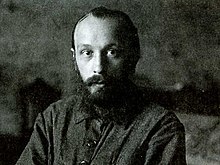
Back ميخائيل باختين Arabic مايكل باختين ARZ Mikhaíl Bakhtín AST Mixail Baxtin Azerbaijani میخاییل باختین AZB Міхаіл Міхайлавіч Бахцін Byelorussian Михаил Бахтин Bulgarian মিখাইল বাখতিন Bengali/Bangla Mikhaïl Bakhtín Catalan Michail Michajlovič Bachtin Czech
Mikhail Bakhtin | |
|---|---|
 Mikhail Bakhtin (1920) | |
| Born | 16 November [O.S. 4 November] 1895 |
| Died | 7 March 1975 (aged 79) |
| Alma mater | Odessa University (no degree) Petrograd Imperial University |
| Era | 20th-century philosophy |
| Region | Russian philosophy |
| Institutions | Mordovian Pedagogical Institute |
Main interests | literary theory, literary criticism |
Notable ideas | Heteroglossia, dialogism, chronotope, carnivalesque, polyphony |
Mikhail Mikhailovich Bakhtin (/bʌxˈtiːn/ bukh-TEEN; Russian: Михаи́л Миха́йлович Бахти́н, IPA: [mʲɪxɐˈil mʲɪˈxajləvʲɪtɕ bɐxˈtʲin]; 16 November [O.S. 4 November] 1895 – 7 March[2] 1975) was a Russian philosopher, literary critic and scholar who worked on literary theory, ethics, and the philosophy of language. His writings, on a variety of subjects, inspired scholars working in a number of different traditions (Marxism, semiotics, structuralism, religious criticism) and in disciplines as diverse as literary criticism, history, philosophy, sociology, anthropology and psychology. Although Bakhtin was active in the debates on aesthetics and literature that took place in the Soviet Union in the 1920s, his distinctive position did not become well known until he was rediscovered by Russian scholars in the 1960s.
- ^ Y. Mazour-Matusevich (2009), Nietzsche's Influence on Bakhtin's Aesthetics of Grotesque Realism, CLCWeb 11:2
- ^ Gary Saul Morson and Caryl Emerson, Mikhail Bakhtin: Creation of a Prosaics, Stanford University Press, 1990, p. xiv.
© MMXXIII Rich X Search. We shall prevail. All rights reserved. Rich X Search